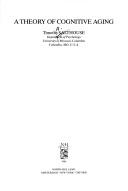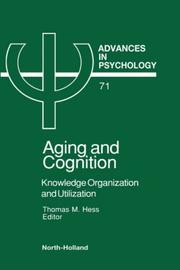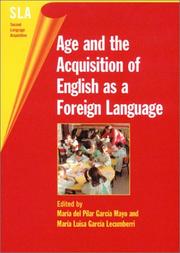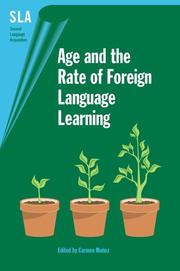| Listing 1 - 10 of 22 | << page >> |
Sort by
|
Book
ISBN: 1635500443 9781635500448 9781635500431 1635500435 Year: 2018 Publisher: San Diego, CA
Abstract | Keywords | Export | Availability | Bookmark
 Loading...
Loading...Choose an application
- Reference Manager
- EndNote
- RefWorks (Direct export to RefWorks)
Voice --- Singing --- Voice Disorders --- Age Factors --- Aging --- physiology --- diagnosis --- Aging, Biological --- Biological Aging --- Senescence --- Mutation Accumulation --- Age Reporting --- Age Factor --- Factor, Age --- Factors, Age
Book
ISBN: 3110332604 9783110332605 1306205662 9781306205665 9783110332452 3110332450 Year: 2014 Publisher: Berlin Boston
Abstract | Keywords | Export | Availability | Bookmark
 Loading...
Loading...Choose an application
- Reference Manager
- EndNote
- RefWorks (Direct export to RefWorks)
Zum Altersfaktor im Deutschen als Zweitsprache existieren bislang nur wenige Untersuchungen. Das Buch gibt einen systematischen Forschungsüberblick über die vorhandenen Studien zur Verbstellung im Deutschen als Zweitsprache und vergleicht die Ergebnisse im Hinblick auf das Erwerbsalter der ProbandInnen. Auf der Basis dieser Forschungsergebnisse entwickelt die Autorin ihre eigene longitudinale Fallstudie, in der sie die Verbstellung bei zwei Halbschwestern mit Erstsprache Russisch in den ersten 18 Kontaktmonaten vergleicht. Die beiden Lernerinnen unterscheiden sich in erster Linie durch ihr Alter bei Erwerbsbeginn (acht vs. 14 Jahre), was einen direkten Vergleich des Erwerbsverlaufs und der Erwerbsgeschwindigkeit erlaubt. Die ungewöhnlich breite Datenbasis von über 10.000 vollständigen Sätzen erlaubt stichhaltige Aussagen zum Erwerb der Satzklammer, der Verb-Zweit-Stellung sowie der Verb-End-Stellung im Nebensatz. Der Grammatikerwerb vor und nach der Pubertät unterscheidet sich hauptsächlich in der Erwerbsgeschwindigkeit, wobei diese auch stark vom Lerngegenstand abhängt. DIE REIHE: DAZ-FORSCHUNG. DEUTSCH ALS ZWEITSPRACHE, MEHRSPRACHIGKEIT UND MIGRATION Die Reihe DaZ-Forschung stellt aktuelle Forschungen zum Deutsch-als-Zweitsprache-Erwerb sowie zu Bildungschancen im Kontext von Migration und Mehrsprachigkeit in Form von Monographien oder Sammelbänden vor.
German language --- Second language acquisition. --- Grammar, Comparative and general --- Verb --- Second language learning --- Language acquisition --- Acquisition. --- Verb. --- Verb phrase --- Verbals --- Reflexives --- Linguistics --- Philology --- German as a second language. --- age factor. --- verb position.

ISBN: 9780080866826 0080866824 9780444878274 0444878270 1281788406 9786611788407 Year: 1985 Publisher: Amsterdam North-Holland
Abstract | Keywords | Export | Availability | Bookmark
 Loading...
Loading...Choose an application
- Reference Manager
- EndNote
- RefWorks (Direct export to RefWorks)
Over a half-century of research has documented the fact that people of different ages perform at different levels on a variety of tests of cognitive functioning, and yet there are still no comprehensive theories to account for these phenomena. A Theory of Cognitive Aging is intended to begin intellectual discussion in this area by identifying major issues of controversy, and proposing a particular theoretical interpretation based on the notion that the rate of processing information slows down with increased age.
Cognition --- Age Factors --- Cognitive Function --- Cognitions --- Cognitive Functions --- Function, Cognitive --- Functions, Cognitive --- Age Reporting --- Age Factor --- Factor, Age --- Factors, Age --- Age factors in cognition --- Ability, Influence of age on --- Age factors --- Ability, Influence of age on. --- Age factors.

ISBN: 044488369X 9786611760045 1281760048 0080867251 9780080867250 9780444883698 Year: 1990 Publisher: Amsterdam North Holland
Abstract | Keywords | Export | Availability | Bookmark
 Loading...
Loading...Choose an application
- Reference Manager
- EndNote
- RefWorks (Direct export to RefWorks)
During the past two decades, there has been a dramatic increase in interest in the study of aging-related changes in cognitive abilities. In this volume researchers from a variety of theoretical perspectives discuss adult age differences in a wide range of cognitive skills. Of special interest is the extent to which aging effects on performance are related to variations in the representation, organization, and utilization of knowledge, broadly defined. Recent research and theory in the field of aging has emphasized the need to examine such processes more closely in order to provide a more comp
Aging --- Cognition --- Memory --- Age Factors --- Executive Function --- Cognitive Function --- Cognitions --- Cognitive Functions --- Function, Cognitive --- Functions, Cognitive --- Age Reporting --- Age Factor --- Factor, Age --- Factors, Age --- Age factors in memory --- Ability, Influence of age on --- Age factors in cognition --- Psychological aspects --- Age factors --- psychology --- Age factors. --- Psychological aspects.


ISBN: 1788920384 128082817X 9786610828173 9781853596403 185359640X 9781853596407 1853596396 9781853596391 1853596388 1853596396 9781853596391 9781853596384 9781788920384 Year: 2003 Volume: 4. Publisher: Bristol Blue Ridge Summit
Abstract | Keywords | Export | Availability | Bookmark
 Loading...
Loading...Choose an application
- Reference Manager
- EndNote
- RefWorks (Direct export to RefWorks)
This book provides an overview of current research on the age factor in foreign language learning, addressing issues, which are critical for language planning. It presents new research on foreign language learning within bilingual communities in formal instruction settings focussing on syntax, phonology, writing, oral skills and learning strategies.
Bilingualism in children. --- English language --- Language acquisition --- Language and languages --- Foreign language study --- Language and education --- Language schools --- Age factors in language acquisition --- Ability, Influence of age on --- EFL (Language study) --- English as a foreign language --- English as a second language --- English to speakers of other languages --- ESL (Language study) --- ESOL (Language study) --- Teaching English as a second language --- TEFL (Language study) --- TESL (Language study) --- Children --- Study and teaching --- Foreign speakers. --- Age factors. --- Study and teaching. --- Foreign students --- Langage --- Langage et langues --- Anglais (Langue) --- Bilinguisme chez l'enfant --- Acquisition --- Facteurs liés à l'âge --- Etude et enseignement --- Allophones --- Language and languages Study and teaching --- Interpersonal communication in children --- Psycholinguistics --- Germanic languages --- age and SLA. --- age and foreign language learning. --- age factor in SLA. --- age factor. --- age in second language acquisition. --- language learning. --- second language acquisition.

ISBN: 1853597570 1853597589 1853597597 1280828420 9781853597597 9786610828425 9781853597594 1847699294 9781853597596 9781847699299 9781853597589 9781853597572 Year: 2004 Volume: 9 Publisher: Clevedon Multilingual Matters Ltd
Abstract | Keywords | Export | Availability | Bookmark
 Loading...
Loading...Choose an application
- Reference Manager
- EndNote
- RefWorks (Direct export to RefWorks)
This book examines the evidence relative to the idea that there is an age factor in first and second language acquisition, evidence that has sources ranging from studies of feral children to evaluations of language programmes in primary schools. It goes on to explore the various explanations that have been advanced to account for such evidence. Finally, it looks at the educational ramifications of the age question, with particular regard to formal second language teaching in the early school years and in ‘third age’ contexts.
Psycholinguistics --- Didactics of languages --- Language acquisition --- Age factors --- Language acquisition - Age factors. --- Language / Linguistics. --- Languages & Literatures --- Philology & Linguistics --- Age factors. --- Age factors in language acquisition --- Ability, Influence of age on --- Interpersonal communication in children --- Language acquisition - Age factors --- L1 acquisition. --- L2 acquisition. --- L2 learning. --- L2 teaching. --- SLA. --- Second Language Acquisition. --- age factor. --- age in language learning. --- foreign language teaching. --- language learning. --- second language education. --- second language teaching.


ISBN: 1853598925 1853598917 9781853598920 9781853598913 9781853598937 1853598933 1280507799 9786610507795 1847699774 9781847699770 Year: 2006 Volume: 19 Publisher: Bristol Blue Ridge Summit
Abstract | Keywords | Export | Availability | Bookmark
 Loading...
Loading...Choose an application
- Reference Manager
- EndNote
- RefWorks (Direct export to RefWorks)
This book examines the various ways in which age affects the process and the product of foreign language learning in a school setting. It presents studies that cover a wide range of topics, from phonetics to learning strategies. It will be of interest to students and researchers working in SLA research, language planning and language teaching.
Language acquisition --- Language and languages --- Age factors. --- Study and teaching. --- Age factors --- Study and teaching --- Foreign language study --- Age factors in language acquisition --- Language and education --- Language schools --- Ability, Influence of age on --- Language and languages Study and teaching --- Interpersonal communication in children --- Psycholinguistics --- Language acquisition - Age factors --- Language and languages - Study and teaching --- SLA research on age. --- SLA. --- age and foreign language learning. --- age and language learning. --- age and second language acquisition. --- age factor. --- foreign language learning in a school setting.
Book
ISBN: 1783097647 Year: 2017 Publisher: Blue Ridge Summit, PA : Multilingual Matters,
Abstract | Keywords | Export | Availability | Bookmark
 Loading...
Loading...Choose an application
- Reference Manager
- EndNote
- RefWorks (Direct export to RefWorks)
This book constitutes a holistic study of how and why late starters surpass early starters in comparable instructional settings. Combining advanced quantitative methods with individual-level qualitative data, it examines the role of age of onset in the context of the Swiss multilingual educational system and focuses on performance at the beginning and end of secondary school, thereby offering a long-term view of the teenage experience of foreign language learning. The study scrutinised factors that seem to prevent young starters from profiting from their extended learning period and investigated the mechanisms that enable late beginners to catch up with early beginners relatively quickly. Taking account of contextual factors, individual socio-affective factors and instructional factors within a single longitudinal study, the book makes a convincing case that age of onset is not only of minimal relevance for many aspects of instructed language acquisition, but that in this context, for a number of reasons, a later onset can be beneficial.
Language acquisition --- Classroom environment. --- Second language acquisition. --- Age factors. --- CLIL. --- L2 instructional learning. --- SLA. --- affective factors. --- age factor. --- age research. --- classroom L2 learning. --- crosslinguistic influence. --- early FL learning . --- foreign language learning. --- individual differences. --- language policies. --- language proficiency. --- literacy. --- multilevel modelling. --- psycholinguistics. --- second language acquisition. --- second language education. --- teenage learners. --- the role of age in language learning. --- young learners. --- younger is better in foreign language learning.
Book
ISBN: 0805804242 9780805804249 Year: 1991 Publisher: Hillsdale Erlbaum
Abstract | Keywords | Export | Availability | Bookmark
 Loading...
Loading...Choose an application
- Reference Manager
- EndNote
- RefWorks (Direct export to RefWorks)
Age Factors --- Aging --- Cognition --- Memory --- Vieillissement --- Mémoire --- psychology --- Psychological aspects --- Age factors --- Aspect psychologique --- Facteurs liés à l'âge --- Age, Facteurs de l' --- Age Factors. --- Cognition. --- Memory. --- -Cognition --- -Memory --- -Retention (Psychology) --- Intellect --- Psychology --- Thought and thinking --- Comprehension --- Executive functions (Neuropsychology) --- Mnemonics --- Perseveration (Psychology) --- Reproduction (Psychology) --- Age --- Ageing --- Senescence --- Developmental biology --- Gerontology --- Longevity --- Age factors in disease --- Executive Function --- Cognitive Function --- Cognitions --- Cognitive Functions --- Function, Cognitive --- Functions, Cognitive --- Age Reporting --- Age Factor --- Factor, Age --- Factors, Age --- psychology. --- Physiological effect --- -psychology. --- Mémoire --- Facteurs liés à l'âge --- Age factors in memory --- Ability, Influence of age on --- Age factors in cognition --- Cognition - Age factors --- Memory - Age factors --- Aging - Psychological aspects

ISBN: 185359718X 1853597171 1853597198 1280828323 9786610828326 1788920465 9781853597190 9781853597183 9781853597176 Year: 2004 Volume: 7. Publisher: Bristol Blue Ridge Summit
Abstract | Keywords | Export | Availability | Bookmark
 Loading...
Loading...Choose an application
- Reference Manager
- EndNote
- RefWorks (Direct export to RefWorks)
This work critically addresses the age debate in second language acquisition studies, presenting an in-depth study of factors that predict foreign accent. Quantitative and qualitative analyses confirm that cognitive, social, and psychological factors contribute to attainment, and that biological influences must therefore be considered alongside these essential aspects of learner experience.
Second language acquisition --- Language acquisition --- Langue seconde --- Langage --- Research --- Age factors --- Acquisition --- Recherche --- Facteurs liés à l'âge --- Child development. --- Second language acquisition. --- Linguistic analysis (Linguistics). --- Child development --- Philology & Linguistics --- Languages & Literatures --- Facteurs liés à l'âge --- Second language learning --- Child study --- Children --- Development, Child --- Development --- Developmental biology --- Developmental psychobiology --- Child rearing --- SLA. --- accent and language learning. --- age and SLA. --- age factor in SLA. --- age in second language acquisition. --- cognitive factors and language attainment. --- foreign accent. --- foreign language accent. --- psychological factors and language attainment. --- second language acquisition. --- social factors and language attainment.
| Listing 1 - 10 of 22 | << page >> |
Sort by
|

 Search
Search Feedback
Feedback About UniCat
About UniCat  Help
Help News
News